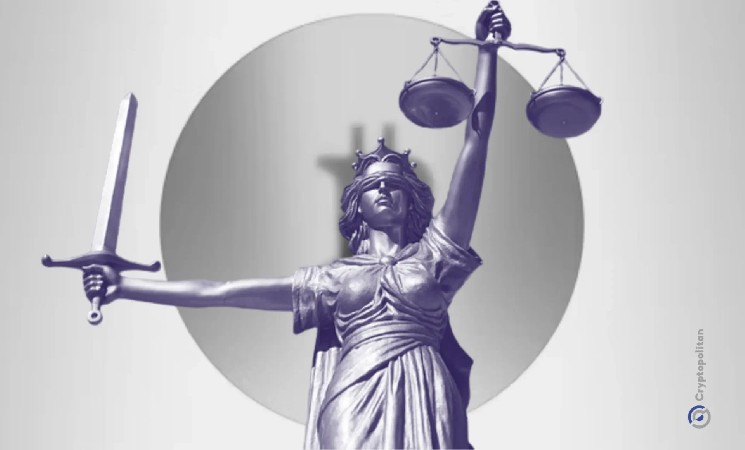Lexington duo arrested for crypto-related romantic scams

A Lexington duo is set to plead guilty to a Columbian court after they were arrested for running an elaborate cryptocurrency-related romance scam online as well as misuse of third-party businesses’ email accounts.
According to the prosecution, between 2021 and 2022, Kenneth Brown Jr. and Nicholas Shepard made over $600,000 from romantic scams run online.
The Lexington duo claimed ignorance of the offenses
The two, who run a small-scale precious metal and artifact pawning company, Golden Eagle Precious Metals Exchange, claimed that they were unaware of any underlying and sinister practices relating to their work.
According to the courts, unsuspecting romantic partners would have their cash or assets, change to cryptocurrency through them and later lose access to the account.
It is alleged that the scheme involved transfer of money to Golden Eagle, coming from two sets of victims. One set of victims included individuals involved in romantic scams who were made to transfer money to Golden Eagle.
The other set of victims involved businesses with assets that had been compromised and tricked into sending money through the first set of victims who would then move it to Golden Eagle using their personal accounts.
“Once the funds were deposited into the Truist account, the funds were transferred via wire to an account at Voyager controlled by defendant, Nicholas R. Shepard, (who) then converted the funds to cryptocurrency.”
Court papers.
The romance scam victims were from California, Colorado, Georgia, Florida, and West Virginia.
If found guilty, the pair could face 20 years in prison and or be asked to pay a $ 250,000 fine. The duo is expected to appear again before courts during the last week of September when they will plead guilty to charges related to conspiracy to commit wire fraud and email fraud, according to court papers.
Large laundering network involved
Through their lawyer Lester “Gill” Bell, Brown and Shepard admitted to the indirect influences of the drug underworld but denied active participation. Brown also indicated that Brown and his brother-in-law Shepard were groomed into this practice by a large laundering network.
According to the information on the filing with the US District Court, the network has “known and unknown” people who were involved in orchestrating the alleged scheme, although it does not give the finer details. Despite this, their lawyer maintains they were unaware of their illegal actions.
“Mr Brown was devastated when he realized the money he was converting to cryptocurrency was allegedly from victims of a romance scam.”
Lawyer.
He immediately began cooperating [with authorities] and also willingly forfeited a substantial amount of assets to satisfy the majority of the restitution,” added their lawyer’s submissions to the court.
The pair is trying to make sense of the situation and has committed to work towards ensuring that those affected get a bit of recourse.
“It’s very unfortunate he fell into this web but he’s adamant about taking accountability and doing everything possible to make whole those affected by his misplaced trust,” their lawyer said.
The two have been working closely with the government on the best interventions also willingly forfeited a substantial amount of their assets to meet most of the restitution.
Micah Caskey, who represented Shepard, said: “Both Mr. Brown and Mr. Shepherd have fully cooperated with the government throughout this ordeal. Since the first moment they became aware of this matter, they have accepted responsibility and offered to help in every way they could.”
The number of people misrepresenting themselves online is now common, however, this issue is unique in that most who fell victim thought they were making a well-considered decision. However, reports show there is an increase in number of cases where crypto is now being used to launder money.
In their July report, Chainalysis said: “The growing ubiquity of crypto has made it a tool for laundering proceeds from various off-chain crimes, such as narcotics trafficking and fraud.”




 Bitcoin
Bitcoin  Ethereum
Ethereum  Tether
Tether  USDC
USDC  Dogecoin
Dogecoin  Cardano
Cardano  TRON
TRON  Chainlink
Chainlink  Bitcoin Cash
Bitcoin Cash  LEO Token
LEO Token  Litecoin
Litecoin  Dai
Dai  Stellar
Stellar  Ethereum Classic
Ethereum Classic  Monero
Monero  Cronos
Cronos  Stacks
Stacks  OKB
OKB  Hedera
Hedera  Cosmos Hub
Cosmos Hub  Maker
Maker  KuCoin
KuCoin  Theta Network
Theta Network  Gate
Gate  Algorand
Algorand  Polygon
Polygon  NEO
NEO  EOS
EOS  Tezos
Tezos  Zcash
Zcash  Tether Gold
Tether Gold  Synthetix Network
Synthetix Network  TrueUSD
TrueUSD  IOTA
IOTA  Bitcoin Gold
Bitcoin Gold  Holo
Holo  Dash
Dash  0x Protocol
0x Protocol  Zilliqa
Zilliqa  Siacoin
Siacoin  Enjin Coin
Enjin Coin  Ravencoin
Ravencoin  Basic Attention
Basic Attention  Qtum
Qtum  Decred
Decred  Ontology
Ontology  NEM
NEM  Lisk
Lisk  Nano
Nano  Numeraire
Numeraire  Pax Dollar
Pax Dollar  DigiByte
DigiByte  Waves
Waves  Status
Status  Hive
Hive  Huobi
Huobi  Steem
Steem  BUSD
BUSD  Ren
Ren  OMG Network
OMG Network  Bitcoin Diamond
Bitcoin Diamond  Bytom
Bytom  Kyber Network Crystal Legacy
Kyber Network Crystal Legacy  HUSD
HUSD